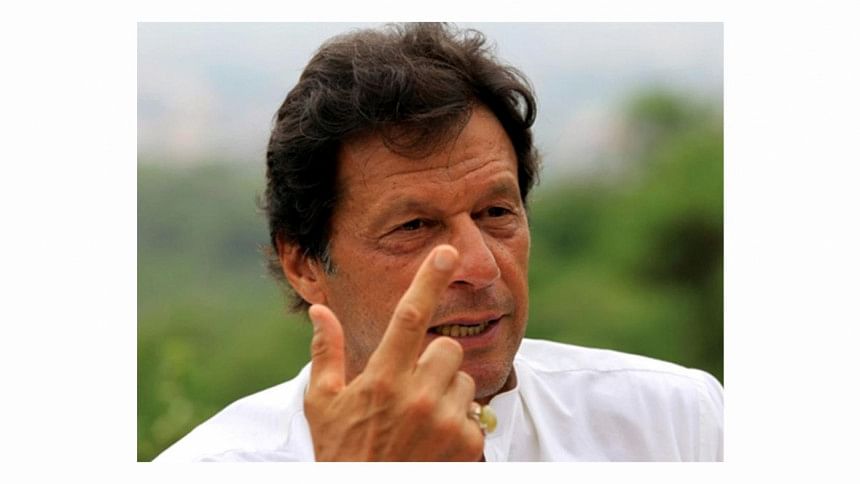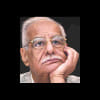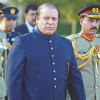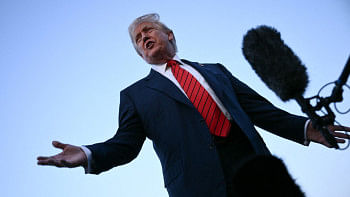Can Imran Khan be the man of the people?

The army in Pakistan seems to have devised a way where a particular person is elected even without a valid cause. Imran Khan is a product of such phenomena. Long before the latest elections, his name was tossed around. One can now assume that probably nobody else fitted into the scheme of things which the army wanted. Nawaz Sharif had been elected in the past but was found wanting in the eyes of the army. Even the military regime of General Pervez Musharraf was not up to the mark.
Why then has the army come into the picture and destroyed the process of elections? The army seems to have realised that it should rule directly with a person who takes pride in being a stalking horse of the army. The cricketer-turned-politician, Imran Khan, has been there in politics for a long time but never made the grade.
General Zia-ul-Haq and General Musharraf were through and through the army's men. They ruled like martial law dictators and alienated the public. The army was visible all the way, and its chief was even seen sitting in the cabinet meetings apparently to guide the affairs according to its needs when Nawaz Sharif was the prime minister. The experiment which is now being made is to have such a civilian at the head who is the army's man in thinking and action. This, obviously, lessens the chance of the army's direct rule.
The democratic countries have said openly that Pakistan was under the army rule. Will Imran Khan's credentials be acceptable to the West? The next few months of Khan's rule will show this. It would depend on Imran Khan whether he can please both rulers—the army and the people.
As far as India is concerned, its role now is that of a spectator. It can have surgical operations like the ones it had done before. Anything more can start a regular war. Imran has said during his victory speech, soon after his Pakistan Tehreek-e-Insaf (PTI) party emerged as the single largest outfit in the elections, that he would like to have good relations with India. If India takes one step, he said, he would take two to further their relationship. Yet, Imran reiterated that Kashmir remains the core issue.
He is unmindful of the fact that the Kashmiris now want their own Islamic sovereign republic. In other words, the Kashmiris are not looking up to Pakistan for support. Even separatists like Yasin Malik and Shabbir Shah have become irrelevant. Not long ago, when I was in Srinagar to talk to the students, I was astonished to find that they were no longer pro-Pakistan. For them, both New Delhi and Islamabad were on par in forcing their own rule. How would Imran now change their thinking when, in his views, there were only two parties—India and Pakistan—that are privy to the issue?
To the Pakistani prime minister, the Kashmiri youth do not seem to be a party because, instead of two, now the three will have to sit across the table to solve the problem. The Indians would not talk to Pakistan, as foreign minister Sushma Swaraj had indicated, until the country stopped giving shelter to militants. If and when Imran Khan picks up the thread, would he be able to give that kind of assurance?
He is on such a weak wicket that even if he wants to give such an assurance, it would not be taken seriously until the army chief openly supports his stand. At least, no such signs are visible at present. These are early days before Imran Khan settles down in his saddle. But there is no doubt that Khan will want peace in the region to prevail.
Indeed, by extending a hand of friendship to India, Imran has proved to be politically correct and has even managed to score diplomatic points. However, the real test for him would be how much freedom the army would give him to build an equation with India. This has been the army's preserve so far. Delinking the army would mean another overhaul in the state administration because at present its rule goes deep down up to the village level.
A veteran South Asia analyst has taken a dim view of the election results in Pakistan, saying that the most dangerous country in the world has now got considerably more dangerous. According to the analyst, Imran Khan is an outspoken defender of the army and is closely aligned with the Islamist movement patronised by the ISI. This has ominous overtones. Understandably, the US State Department has offered a cautious welcome to the change of guards in Pakistan, a process that remains incomplete.
This may be because Khan has been a vociferous critic of America which, according to him, treated Pakistan like a "doormat." A former CIA analyst and White House official, however, indicated that the Imran Khan-army dalliance could be a short-lived one. The analyst feels that Khan has a reputation for independence and volatility and his political movement is almost a cult of personality. The army may find this as the real stumbling block when it comes to dealing with Khan.
A secular India may find Imran Khan giving more help to militants in Kashmir. Firstly because he thinks that Kashmir should be a part of Pakistan and, secondly, he has to prove to the army commanders that he would be fulfilling their tasks. India will have to face a situation where there is no war and no peace either. In that atmosphere, Khan's tilt towards Islam adds another dimension. It is, too, a confusing situation. Any tinkering can lead to disastrous results.
Imran Khan would have to do something more than a miracle to prove that he is with the people and when the chips are down, he would be on their side. At present, in their minds, he is the army's man. This is an impression that he cannot easily efface.
Kuldip Nayar is an eminent Indian columnist.










Comments